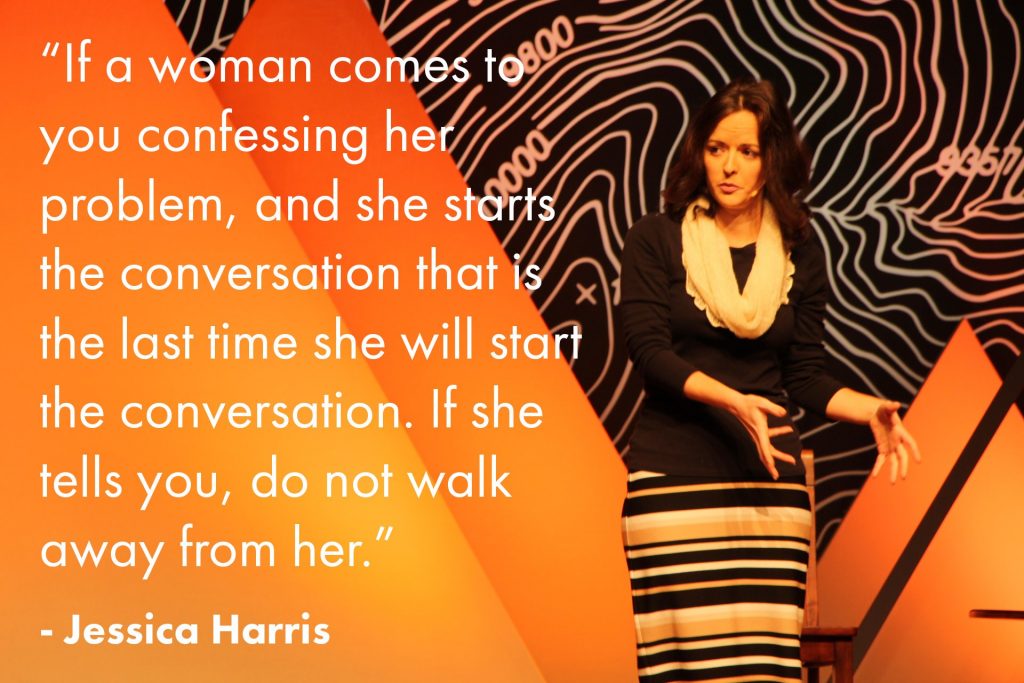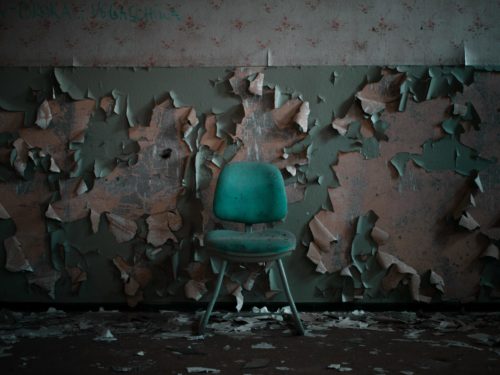The first step in breaking free from a struggle with pornography is to tell someone. It’s important to remember that’s not out of shame. You don’t need to be punished. You’re not “turning yourself in” to someone who is going to help you get in line.
We don’t report symptoms to a doctor so the doctor can yell at us for making wrong choices. We report because we’re looking for help and we know that’s what doctors do.
Yet, when it comes to confessing a struggle with lust or pornography, we can act more like we’re going to the principal’s office at school to report we cheated on a test. We share and immediately expect punishment instead of sharing in hopes of getting help. For some reason, we feel it’s shameful to ask for help breaking free from struggles like this.
Sharing your struggle lets someone into your story so you can draw strength, courage, and direction from them.
It’s a terrifying step, for sure, and it’s harder when you don’t know who you can tell.
You may not feel you can tell anyone in your life. Like so many e-mails I get, you may think, “There is literally no one I can share this with.”
You feel your struggle is too big, too gross, too hard, or that there will be too much shame in that confession.
You feel there is no one you can trust or that the people you do trust will leave once they know.
You’re afraid of losing position, of your parents finding out, of your husband treating you differently.
And I understand that.
When I was 17 and struggling with pornography, trying to break free, I didn’t feel like I could tell anyone. My church was ultra-conservative and run by older men. Telling one of their wives that a deacon’s granddaughter was a porn addict didn’t seem like it would be helpful. I didn’t feel I could tell anyone in my family.
I felt alone.
But if I were truly honest with myself, it wasn’t because there was no one to tell, it was because I didn’t want someone I knew knowing this thing about me.
See, I had spent years pretending. Pretending to be an outstanding Christian girl, pretending to be a perfect model of purity.
I had spent years lying.
And I didn’t want people to know I was a liar. I didn’t want people to see me for who I really was.
I was afraid of being known.
For years, I balanced my desire for freedom with my fear of intimacy. I wanted to be free, but I didn’t want anyone to know what was going on. Trying to find someone to tell was basically trying to figure out who would be least disappointed in me.
Read: The False Freedom of Anonymous Confession
We’re afraid to share our struggles because we’re not sure what happens next.
We don’t want to lose relationships. We don’t want people to treat us differently. It’s important to us to find someone who is safe. And by safe we mean, “Someone who isn’t going to freak out/leave/treat me differently once I tell them.”
I didn’t share my struggle until I was 90% sure it was safe. Someone else had to start the conversation by saying, “women struggle with porn.” That was the only way I felt safe enough to step forward and share my story.
Even then, I was terrified. What if they had lied to me? What if it wasn’t safe? What if they sent me home?
I tell leaders all the time that when a woman shares this struggle with them it’s because wherever they see themselves headed scares them more than the idea of people knowing.

I recognized that I was blessed to have someone start that conversation for me. Very few women have that opportunity, which is why I do what I do, so more churches and ministries will start talking about it.
But what if you don’t have an obvious safe space?
Maybe your parents don’t care or are the ones who introduced you to porn. Maybe the community you’re in never talks about. Maybe you’re afraid that the type of content you’re into will make it even worse.
What are you supposed to do when you feel there is literally no one to tell?
The key to answering that question: honesty
Be honest about why you can’t tell those you already know
If it helps, make a list of people you are close to. Keep it less than ten, just including people in your “inner circle.” For each name, write the reason why you feel you cannot share your struggle with them. Take careful note: is your answer fact or fear?
For instance, your parents might be on the list. But, if your parents are the ones who introduced you to pornography (which does unfortunately happen), then they probably aren’t going to be helpful. So, you might say, “I don’t feel like I can tell my parents because they’re the ones who introduced me to this and they don’t want to help me.” That’s different from “I don’t feel like I can tell my parents because I’m afraid of letting them down. They will be disappointed in me.”
Do you see the difference there?
Why is this important? It’s important because when you are facing fears, there are ways to tear them down. If there’s a fear that your parents will be disappointed, for instance, then tackle that fear directly. Have an honest conversation with your parents about your fear of disappointment. You don’t even have to mention pornography right away. Why?
Fear is an enemy of intimacy and an enemy of healing.
As long as there is fear in a relationship, there will be lack of trust. The two don’t co-exist.
So really, when you write out a fear about telling a certain person, what you’re actually saying is, “I don’t trust that person.” That trust needs to be formed before you are going to feel comfortable telling them.
This applies to other people too: a spouse, a pastor’s wife, a best friend, a sibling, a mentor, a fiancé. Whatever your fear is, tackle that head on because, most of the time, it’s probably not going to be rooted in truth.
Be honest about your masks
We can fall into the trap, as women, of trying to climb this “good Christian girl” ladder, hoping to outrun our problems. If we lead enough Bible studies. If we sing enough songs. If we win enough awards and smile big enough, no one will ever know.
We create a pedestal and climb on it, then use the pedestal as an excuse for why we can’t tell anyone. Start taking steps down one at a time, serving only where you truly feel called and gifted, not where you feel people will be most impressed.
You need to create space in your life for freedom and healing. Don’t pack your calendar full of commitments that make you look like you have it together. This helps because it manages people’s expectations, especially your own.
Be honest with others
Don’t pretend you’ve got your life together when you really don’t. That doesn’t mean you tell everyone, print a T-shirt, and write a book on it. What it means is you begin practicing humility. You don’t need to air your dirty laundry, but stop pretending you don’t have any.
This doesn’t have to be anything huge.
This can be as simple as a phrase like, “I don’t have my life together.”
It can also be as deep as sitting across from someone on your list and saying, “I want to tell you something. I want to share a struggle I am having in my life, but I’ll be honest, I’m afraid you’ll leave.”
So, in a way, this feeds back into the first point of being honest about why you feel you can’t tell people. This is simply the next step. You are giving that person an opportunity to help build stronger trust.
I did this with my husband.
My husband knew much of my story before we even met. Our love story begins with him reading my book. Still, there are things that have happened in my life that aren’t in that book. There are details I haven’t shared with the world, details that I was even afraid to share with him.
Something I did while we were engaged was tell him, “There are things I’m just not comfortable sharing with you because I don’t want to hurt you.” (this is a fear statement, for the record)
He assured me that I could tell him whatever it was and it would be ok. He assured me of that many times. We even went and saw my counselor together before our marriage. I basically wanted her to tell him, “She doesn’t need to tell you; trust me.” Instead, she encouraged us to be honest with each other. Ouch. She even offered for me to tell him right there in front of her. No thank you!
Eventually, I realized that these secrets would erode the foundation of intimacy in our relationship. By refusing to tell my husband, I wasn’t protecting him. I was telling him, “I don’t trust you.” So, one day, filled with ugly crying and Kleenex, I did.
Read: Porn Addiction, Sexual Trauma, and Why I’m in Counseling
If you truly feel there is no person you can tell, at all. If you truly believe that is not rooted in fear but in the facts of your situation, then I encourage you to seek out a Christian counselor trained in sexual trauma or sexual addiction recovery. Take that first step of sharing your story with them, but don’t just go once and run away. Commit to the program.
Be honest with God
Last but absolutely not least, is to be honest with God. Ask Him to help uncover any fears that are keeping you from sharing. Ask Him to heal broken places of trust in your life.
God is all about healing, and if you truly want to walk in freedom, I firmly believe He will give you the resources not only to find freedom but to find healing. There’s a difference.
Sometimes we get so caught up on breaking free from the struggle that we forget the bigger desire of pursuing healing. That’s what God is after. He’s after reconciliation not “good Christian girls.”
And if you’re honest, many of you may feel like you can’t even trust God with this. You think God is disgusted with you, angry at you, and punishing you. I’ll tell you this: if you struggle to trust God, you will struggle even more to trust a person.
It might be your culture, family, or position that makes you feel like there’s no one you can tell. Start with your connection with God first, and pray for others to come.






